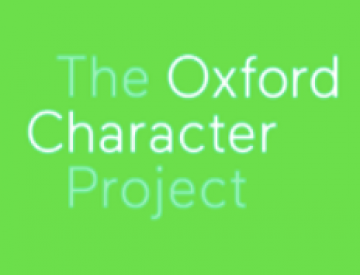The Oxford Character Project: The Arts of Leading

The language of ‘leadership’, while ubiquitous, is dominated by discourses in business and politics, which tend to focus narrowly on cultivating instrumental skills rather than virtues of character. How might research in the humanities enable us to overcome this character deficit and illuminate the arts of good leadership?
Since 2014, The Oxford Character Project has been conducting research into character formation and developing a student programme that brings together Oxford postgraduates from across the University to consider the nature of leadership and the qualities of character needed to exercise leadership that furthers the common good.
‘The Arts of Leading’ is a research project that has grown out of our engagement with the humanities over the last two years. Our aim is to promote a wider discussion about character and leadership grounded in study of the humanities. Taking leadership as a fundamentally human category and making personal formation and human flourishing central to our discussion, we are seeking to draw diverse voices into a conversation that explores the relation between ideals of effective leadership and questions concerning who we are and who we aspire to become.
From this perspective, the humanities constitute an important locus of research for the study and practice of global leadership. Our conversation has already included discussions of solitude, friendship, gratitude, humility, practical wisdom, and biography, and we have been seeking to learn from literature, poetry, film, music, portraiture, philosophy, and theology in conjunction with the more typical leadership discourses of business and politics. We are eager to explore new ways of understanding and imagining the arts of leading.
Contact:
Ed Brooks
ed.brooks@oxfordcharacter.org
The Oxford Character Project: The Arts of Leading

Prof. Stephen Tuck; Start Where the People Are: Leadership and the Civil Rights Movement (November 2016)
A talk focused on modern race equality struggles in Britain and America with recent books including We Ain’t What We Ought to Be: The Black Freedom Struggle from Emancipation to Obama and The Night Malcolm X Spoke at the Oxford Union: A Transatlantic Story of Antiracist Protest. He talked about varieties of leadership in the Civil Rights Movement, comparing the leadership model of Martin Luther King with leadership in the movement’s grassroots.
Public Sex (May 2017)
The second lecture in The Oxford Character Project ‘Arts of Leading’ series was given by Professor Sarah Williams, Professor in the History of Christianity at Regent College, Vancouver. The talk focused on the life and leadership of feminist philosopher and social activist, Josephine Butler (1828-1906).
Cultivating Virtue in the University (May 2017)
A two-day conference was held to bring together distinguished scholars and practitioners to explore the role of character development in higher education. These included:
Nigel Biggar (University of Oxford)
Jonathan Brant (University of Oxford)
Joanna Collicutt (University of Oxford)
Liz Gulliford (University of Birmingham)
Michael Lamb (Wake Forest University/University of Oxford)
Christian B. Miller (Wake Forest University)
Blaire Morgan (University of Birmingham)
Paula Moya (Stanford University)
Onora O'Neill (University of Cambridge)
Julie Reuben (Harvard University)
Jessica Richard (Wake Forest University)
Chad Wellmon (University of Virginia)
What is trust and how can leaders build it? (January 2018)
A talk was held: the speaker was Tom Simpson, Associate Professor of Philosophy and Public Policy at the Blavatnik School of Government and BBC Radio 3 New Generation Thinker. Tom is an expert on the philosophy of trust, and an experienced leader with 5 years service as an officer in the Royal Marines Commandos serving in Northern Ireland, Baghdad, Iraq, and Afghanistan.
Engaging with the Humanities in Collaboration with the Oxford Character Project (May 2018)
Ian Kiaer, Associate Professor of Fine Art and Director of Undergraduate Studies at the Rusklin School of Art, delivered a session using examples from his recent exhibition in the Musee D’art Moderne in Paris, to think through how we might come to a painting, image, object or model with little information or prior knowledge.


